Congratulations to the five recipients of the ELCA Disability Ministries grants for 2023! We have invited each to offer a snapshot of the project their grant will be fun, ding.
Thank you to all applicants! It is amazing to learn about all that is being done across our church for accessibility and inclusion! We were blown away by the number of project applications submitted and all that they entailed for your ministries. We hope those not chosen this time around will consider applying in the future.
I want to offer a special thanks to the advisory team for all their hard work in reviewing the grant applications and proposals. Thank you for all you do!
–Rev. Lisa Heffernan, ELCA Disability Ministries coordinator
2023 Grant Recipients
St. Paul Lutheran Church, Davenport, IA
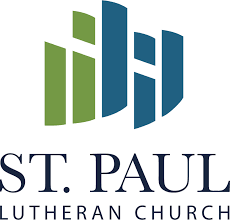 Located in the heart of the Quad Cities, St. Paul Lutheran Church is a congregation of over one thousand families, many of whom have children and teens who identify as autistic or neurodivergent. Social Spectrum began at St. Paul in the summer of 2022 as a support group for parents and caregivers of neurodivergent individuals to connect and find empathy with one another. The stories, experiences, and needs shared within this group clearly identified several opportunities for growth in the ways the church as a whole welcomes, supports, and empowers neurodivergent children and youth and their families. The funding from the ELCA Disability Ministries grant will bolster St. Paul’s efforts to address these needs, amplify autism inclusivity and awareness, and hopefully inspire other congregations to do the same.
Located in the heart of the Quad Cities, St. Paul Lutheran Church is a congregation of over one thousand families, many of whom have children and teens who identify as autistic or neurodivergent. Social Spectrum began at St. Paul in the summer of 2022 as a support group for parents and caregivers of neurodivergent individuals to connect and find empathy with one another. The stories, experiences, and needs shared within this group clearly identified several opportunities for growth in the ways the church as a whole welcomes, supports, and empowers neurodivergent children and youth and their families. The funding from the ELCA Disability Ministries grant will bolster St. Paul’s efforts to address these needs, amplify autism inclusivity and awareness, and hopefully inspire other congregations to do the same.
Specifically, St. Paul’s Social Spectrum will use grant funding to: 1) launch an inclusive family-learning style Sunday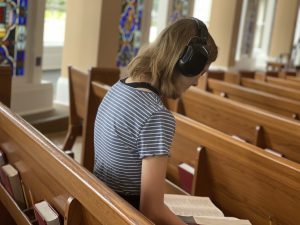 School class; 2) train St. Paul staff and volunteers who work with kids on how best to nurture and support neurodivergent children and youth; 3) construct a sensory-friendly space for faith formation for all ages; and 4) equip neurotypical teens to act as buddies and advocates for their neurodivergent peers. Through these initiatives, St. Paul aims to embrace and raise up an historically under-valued and excluded population in the church, thereby modeling a more inclusive, supportive, and whole community of faith.
School class; 2) train St. Paul staff and volunteers who work with kids on how best to nurture and support neurodivergent children and youth; 3) construct a sensory-friendly space for faith formation for all ages; and 4) equip neurotypical teens to act as buddies and advocates for their neurodivergent peers. Through these initiatives, St. Paul aims to embrace and raise up an historically under-valued and excluded population in the church, thereby modeling a more inclusive, supportive, and whole community of faith.
Emmanuel Lutheran Church, Seymour, WI
Park Vision: Working together, Emmanuel will build an inclusive and accessible community park to inspire, support, celebrate, and equip neurodivergent children and adults to fulfill their potential in life.
What is God asking us to do? An inclusive park!
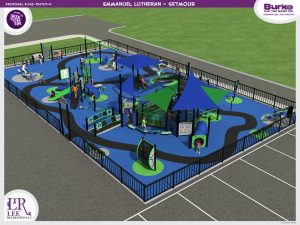 Families with neurodivergent individuals and people dependent on mobility devices face many challenges but enjoying a park shouldn’t be one of them! Inspired by God’s hope and love, Emmanuel will create an inclusive park different from others in the Seymour area and develop accompanying ministries to enrich the lives of families in our community. We celebrate, inspire, and support neurodivergent children, adults, and their caregivers by creating a gathering place for all ages and abilities.
Families with neurodivergent individuals and people dependent on mobility devices face many challenges but enjoying a park shouldn’t be one of them! Inspired by God’s hope and love, Emmanuel will create an inclusive park different from others in the Seymour area and develop accompanying ministries to enrich the lives of families in our community. We celebrate, inspire, and support neurodivergent children, adults, and their caregivers by creating a gathering place for all ages and abilities.
Working together, we reach, teach, and serve by building a community playground where children of all capabilities play side-by-side. This accessible area includes surfaces and ramps for children and adults to engage equipment with or without mobility devices. Emmanuel’s truly inclusive playground is designed for all abilities to participate in various activities at varying difficulty levels within the same space. We share God’s love by respecting and embracing the different ways God has created us. We purposely removed many barriers, so all God’s children feel part of His kingdom and experience the joy of play!
Our faith leads us to establish a community where all feel welcomed and valued. The inclusive park honors this belief by including spaces for multiple uses and all generations. Along with the playground, the complete project consists of bathroom facilities and a pavilion for church gatherings, celebrations, fellowship, and faith formation.
Peace Lutheran Church, Gahanna, OH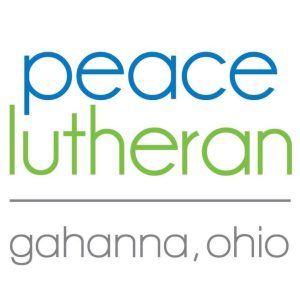
Our goal at Peace Lutheran Church is to move from service ‘for’ people with disabilities to service ‘with’ people with disabilities. We currently provide a program for adults with disabilities that includes a week-long summer resident camp, a bi-weekly Bible Study/Social Group and a Saturday morning respite. For a variety of reasons, we struggle with recruiting volunteers.
The goal of our funded project, Friendship Connections, is to empower people to volunteer their services to connect with people with disabilities, to help broaden the scope of our congregation’s current ministry to become a more welcoming and inclusive community. With education, coaching and hands on experience participants will increase their understanding and confidence. The project has three components: 1) group sessions targeting education, etiquette and awareness, 2) direct experiences with adults with disabilities and 3) creation of a ‘what’s next’ project for each participant to complete the one-year experience.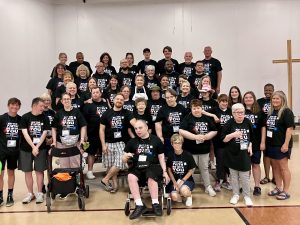
We are grateful for the grant and excited about the coming year as we implement our plans. We hope to open the hearts and minds of the project participants to allow for new and fulfilling relationships with others whom they may otherwise have avoided.
North Avenue Mission, Baltimore, MD
North Ave Mission (NAM) is a Synodically Authorized Worshipping Community of the Delaware/ Maryland Synod of the ELCA. NAM is a fellowship of people experiencing homelessness, people who are food and housing insecure, people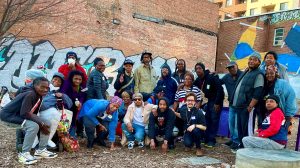 who use drugs and people in recovery, LGBTQ+, those living with physical disability or mental illness and those with lived experience of trauma, racism and hate along with their supporters, in central Baltimore. Centering the leadership and following the visions of those most directly impacted by structural racism and unjust systems, we walk together as we care for our community and one another. Most people in the NAM community and leadership have disabilities ranging from mobility limitations which require assistive devices, treated and untreated mental illness, substance misuse disorder, significant neurodiversity, and a variety of chronic diseases. The community comes together to encourage and support one another on their journeys, to worship, and to serve the wider community.
who use drugs and people in recovery, LGBTQ+, those living with physical disability or mental illness and those with lived experience of trauma, racism and hate along with their supporters, in central Baltimore. Centering the leadership and following the visions of those most directly impacted by structural racism and unjust systems, we walk together as we care for our community and one another. Most people in the NAM community and leadership have disabilities ranging from mobility limitations which require assistive devices, treated and untreated mental illness, substance misuse disorder, significant neurodiversity, and a variety of chronic diseases. The community comes together to encourage and support one another on their journeys, to worship, and to serve the wider community.
Many in the NAM community have remarkable gifts for ministry. Some speak powerfully in testimony, others write and share profound theology and theopoetics, some have the gift of encouragement and building others up, some post daily messages of gratitude and prayer each morning. Others share their perspectives through freestyle and other creative arts. Still others pitch in to make sure Family Life is set up properly, share worship leadership, and ensure that the service runs smoothly. People with disabilities are already and have always been in leadership roles within the NAM community and now some are ready to take the next steps to hone their gifts further so they can be shared beyond the worshipping community.
Building on Leadership Gifts will provide mentoring, hard and soft skill-building, learning opportunities, and enhanced wellbeing supports for three to four specific members of the NAM community for one year so that they can grow as leaders to share their gifts both within and beyond NAM. All four of these individuals will benefit greatly from training and coaching in communications to enable them to write out drafts, workshop with each other’s writing, put into words both faith and the long-term effects of the systemic oppression they have experienced, and grasp the many and varied forms the written and spoken word can take. We are planning a six-month curriculum that will include one-on-one coaching sessions as well as small group workshops for learning, trying out public speaking in safe environments, providing feedback to one another, developing each person’s unique voice, and learning the soft skills of leadership.
Pastor Elazar Zavaletta, Mission Developer at NAM, will identify appropriate ways for these emerging leaders to be connected to settings beyond NAM, while also providing additional leadership opportunities within the NAM community. Experiencing the DE/MD Synod Assembly will increase understanding of the wider church.
Pine Lake Lutheran Camp, Crossways Camping Ministries, WI
Pine Lake Lutheran Camp (part of Crossways Camping Ministries) is excited to extend a wider welcome to faith-filled, camp programming for youth and adults with disabilities! Thanks to the generosity of the ELCA Disability Ministries, Pine Lake Camp will be able to implement new programming and additional supports for campers with disabilities. Our new Self-Determination Camp Program is welcoming adults with disabilities in the middle of August. Young adults with disabilities will come together to create connections, experience traditional camp elements, and create individualized plans for participation in order to engage in meaningful church and community ministry upon their arrivals home.
 Alongside our tailored program, we aim to include a wider community of youth and family program participants throughout the summer by employing an Inclusion Advocate who will serve three primary audiences at three primary times. Our Inclusion Advocate will work with camper families, campers seeking additional support, and the camp staff to provide meaningful supports and needed accessibility. Our Inclusion Advocate will coordinate needed supports in advance of weekly camp programming. In addition, support from the Inclusion Advocate to the staff or campers will happen throughout the onsite week. Finally, Our Inclusion Advocate will record important details after the camp program has completed, in order to plan for future success in other camp programs.
Alongside our tailored program, we aim to include a wider community of youth and family program participants throughout the summer by employing an Inclusion Advocate who will serve three primary audiences at three primary times. Our Inclusion Advocate will work with camper families, campers seeking additional support, and the camp staff to provide meaningful supports and needed accessibility. Our Inclusion Advocate will coordinate needed supports in advance of weekly camp programming. In addition, support from the Inclusion Advocate to the staff or campers will happen throughout the onsite week. Finally, Our Inclusion Advocate will record important details after the camp program has completed, in order to plan for future success in other camp programs.
In addition to our new Self-Determination Camp program and Inclusion Advocate staff position, we are investing in other ways to build meaningful relationships and opportunities for our siblings in Christ with disabilities. We are working with the Division of Vocational Rehabilitation (DVR) to train, support and employ a young adult with disabilities on our current camp staff. In addition, we welcomed a self advocate with an Intellectual and developmental disability, to lead a staff training session on best practices for including and supporting campers with disabilities.
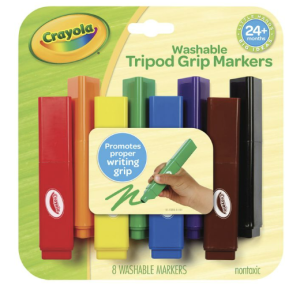

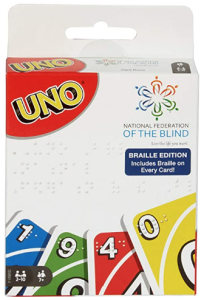

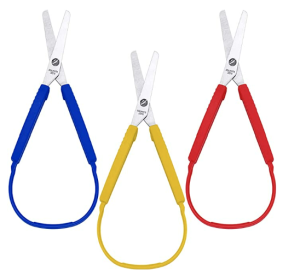
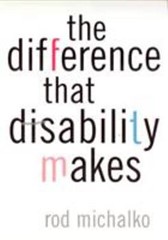
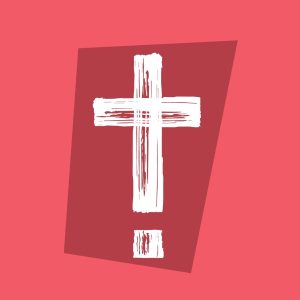 you’d be right. But what makes The tAble exceptional is that it brings together youth who have a shared experience of living with a disability. We know that every youth who comes to The tAble brings their own story, struggles, triumphs, and ways that they experience the world around them. But they also share an identity as a child of God who has created them to be fully themselves. They discover a sense of belonging, knowing that others who are there get the part of their story that isn’t translatable to the able-bodied world.
you’d be right. But what makes The tAble exceptional is that it brings together youth who have a shared experience of living with a disability. We know that every youth who comes to The tAble brings their own story, struggles, triumphs, and ways that they experience the world around them. But they also share an identity as a child of God who has created them to be fully themselves. They discover a sense of belonging, knowing that others who are there get the part of their story that isn’t translatable to the able-bodied world. Located in the heart of the Quad Cities, St. Paul Lutheran Church is a congregation of over one thousand families, many of whom have children and teens who identify as autistic or neurodivergent.
Located in the heart of the Quad Cities, St. Paul Lutheran Church is a congregation of over one thousand families, many of whom have children and teens who identify as autistic or neurodivergent.  School class; 2) train St. Paul staff and volunteers who work with kids on how best to nurture and support neurodivergent children and youth; 3) construct a sensory-friendly space for faith formation for all ages; and 4) equip neurotypical teens to act as buddies and advocates for their neurodivergent peers. Through these initiatives, St. Paul aims to embrace and raise up an historically under-valued and excluded population in the church, thereby modeling a more inclusive, supportive, and whole community of faith.
School class; 2) train St. Paul staff and volunteers who work with kids on how best to nurture and support neurodivergent children and youth; 3) construct a sensory-friendly space for faith formation for all ages; and 4) equip neurotypical teens to act as buddies and advocates for their neurodivergent peers. Through these initiatives, St. Paul aims to embrace and raise up an historically under-valued and excluded population in the church, thereby modeling a more inclusive, supportive, and whole community of faith. Families with neurodivergent individuals and people dependent on mobility devices face many challenges but enjoying a park shouldn’t be one of them! Inspired by God’s hope and love, Emmanuel will create an inclusive park different from others in the Seymour area and develop accompanying ministries to enrich the lives of families in our community. We celebrate, inspire, and support neurodivergent children, adults, and their caregivers by creating a gathering place for all ages and abilities.
Families with neurodivergent individuals and people dependent on mobility devices face many challenges but enjoying a park shouldn’t be one of them! Inspired by God’s hope and love, Emmanuel will create an inclusive park different from others in the Seymour area and develop accompanying ministries to enrich the lives of families in our community. We celebrate, inspire, and support neurodivergent children, adults, and their caregivers by creating a gathering place for all ages and abilities.

 who use drugs and people in recovery, LGBTQ+, those living with physical disability or mental illness and those with lived experience of trauma, racism and hate along with their supporters, in central Baltimore. Centering the leadership and following the visions of those most directly impacted by structural racism and unjust systems, we walk together as we care for our community and one another. Most people in the NAM community and leadership have disabilities ranging from mobility limitations which require assistive devices, treated and untreated mental illness, substance misuse disorder, significant neurodiversity, and a variety of chronic diseases. The community comes together to encourage and support one another on their journeys, to worship, and to serve the wider community.
who use drugs and people in recovery, LGBTQ+, those living with physical disability or mental illness and those with lived experience of trauma, racism and hate along with their supporters, in central Baltimore. Centering the leadership and following the visions of those most directly impacted by structural racism and unjust systems, we walk together as we care for our community and one another. Most people in the NAM community and leadership have disabilities ranging from mobility limitations which require assistive devices, treated and untreated mental illness, substance misuse disorder, significant neurodiversity, and a variety of chronic diseases. The community comes together to encourage and support one another on their journeys, to worship, and to serve the wider community. Alongside our tailored program, we aim to include a wider community of youth and family program participants throughout the summer by employing an Inclusion Advocate who will serve three primary audiences at three primary times. Our Inclusion Advocate will work with camper families, campers seeking additional support, and the camp staff to provide meaningful supports and needed accessibility. Our Inclusion Advocate will coordinate needed supports in advance of weekly camp programming. In addition, support from the Inclusion Advocate to the staff or campers will happen throughout the onsite week. Finally, Our Inclusion Advocate will record important details after the camp program has completed, in order to plan for future success in other camp programs.
Alongside our tailored program, we aim to include a wider community of youth and family program participants throughout the summer by employing an Inclusion Advocate who will serve three primary audiences at three primary times. Our Inclusion Advocate will work with camper families, campers seeking additional support, and the camp staff to provide meaningful supports and needed accessibility. Our Inclusion Advocate will coordinate needed supports in advance of weekly camp programming. In addition, support from the Inclusion Advocate to the staff or campers will happen throughout the onsite week. Finally, Our Inclusion Advocate will record important details after the camp program has completed, in order to plan for future success in other camp programs.